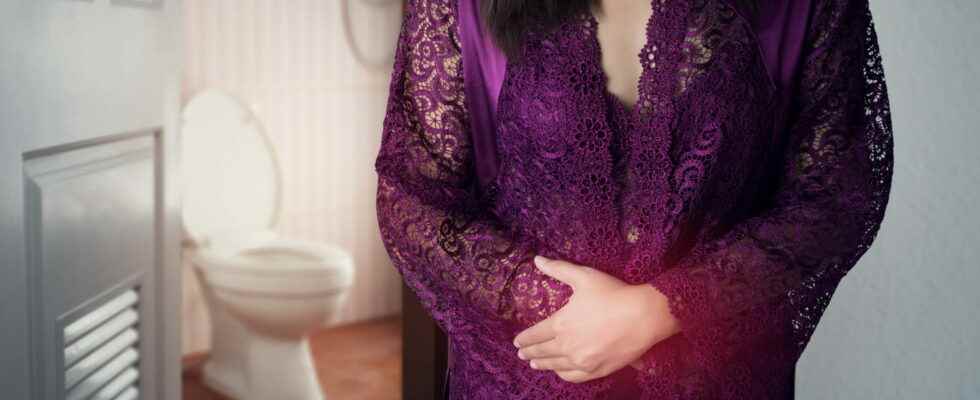Fecaloma or “stool plug” is characterized by an abnormal accumulation of dry, hard feces in the rectum. It is one of the complications of chronic constipation. What to do ? How to evacuate it? A laxative? An enema?
A fecal impaction corresponds to theaccumulation of dry, dehydrated, very hard stoolswhich obviously favors the constipation. We can also speak of “stool plug“. These feces most often accumulate in the rectum, the final part of the intestine (terminal colon and rectal ampulla). Rapid treatment is necessary. What are the causes of the appearance of a fecal impaction? What are the symptoms How to pass a stool plug With a laxative An enema How to evacuate a faecal impaction naturally
Definition: what is a faecal impaction?
Ultimate complication of constipation, fecal impaction is a abnormal concentration of dry, very hard feces that most often accumulates in the rectum, i.e. the terminal part of the intestine. It is serious bowel disease which requires prompt medical attention. False diarrhea or faecal incontinence in a constipated person is often indicative of a faecal impaction.
Diagram of a fecal impaction
What are the symptoms of a faecal impaction?
During a fecaloma, severely dehydrated stools are very difficult to pass naturally and form what can be considered as a “plug” of stool. ensues often extremely painful constipation, which must encourage consultation. Faecal impaction can manifest as abdominal pain, diarrhea, nausea and/or vomiting. In the most severe cases, it induces bowel obstruction which is accompanied by urinary retention or incontinence, as well as agitation and/or confusion and even pelvic venous thrombosis.
In summary, here are the symptoms of a faecal impaction:
- Pelvic, abdominal or rectal pain
- Urgent urge to go to the WC but inability to pass stools
- False diarrhea, caused by irritation of the rectal walls
What are the possible causes of a faecal impaction?
Faecal impaction is linked to chronic constipation, favored by:
- A lack of physical activity
- Prolonged immobilization
- Nervous system disorders preventing proper bowel movement (affecting defecation reflexes)
- A fiber deficiency (lack of vegetables, fruits and whole grains)
- Taking certain medications such as anticholinergics, morphine, calcium channel blockers, or antidepressants for example.
- Poor hydration
Some people are more likely to develop fecal impaction, such as the elderly, stressed or anxious people, or people who remain bedridden or immobilized for a long time, following surgery for example.
When to consult in case of stool blockage?
In case of chronic constipation with abnormal onset of diarrhoea, intense abdominal pain and nausea and vomiting, a medical consultation is necessary, preferably urgently. In any case, chronic constipation is not trivial and requires regular medical monitoring and possibly the opinion of a gastroenterologist.
What are the complications of a faecal impaction?
Among the most common complications of a faecal impaction are:
- A bowel obstruction which needs to be taken care of urgently
- A perforation of the rectal wall (rarer)
- Rectal ulceration (rarer)
- Bladder compression (rarer)
- Arterial ischemia
- anal incontinence
- A compartment syndrome
Taken in time, a simple evacuating enema (oral solution) softens the stools to evacuate the fecal impaction by natural means. On the other hand, an enema or micro-enema are often ineffective, because the very hard mass of the fecal impaction prevents the introduction of the cannula into the rectum. taking laxatives also helps treat faecal impaction. If left untreated, faecal impaction can, on the other hand, lead to bowel obstruction, which requires emergency surgery.
Natural treatments are often insufficient given the severity of a faecal impaction.
What are the natural remedies to evacuate a faecal impaction?
Natural treatments are often insufficient given the severity of a faecal impaction. However, certain foods such as wheat bran, prunes, mucilage plants (psyllium, agar agar, guar gum), or flax seeds can help fight constipation. Homeopathy can also help, but always in addition to medical treatment: Plumbum 5CH when constipation is associated with severe abdominal pain and Opium 5CH in the event of very hard stools.
To prevent the occurrence of fecal impaction, it is preferable to:
► Fight against chronic constipation by adopting a diet high in fiber (fruits, green vegetables, prunes, cereals, etc.)
► Drink magnesium-rich water and in practicing regular physical activity (about 1.5L per day)
► Avoid drugs that constipate: anticholinergics, morphine, calcium channel blockers, or antidepressants for example.
► Go to the toilet at regular times favoring the time after the meal.
For further : French National Society of Gastroenterology
